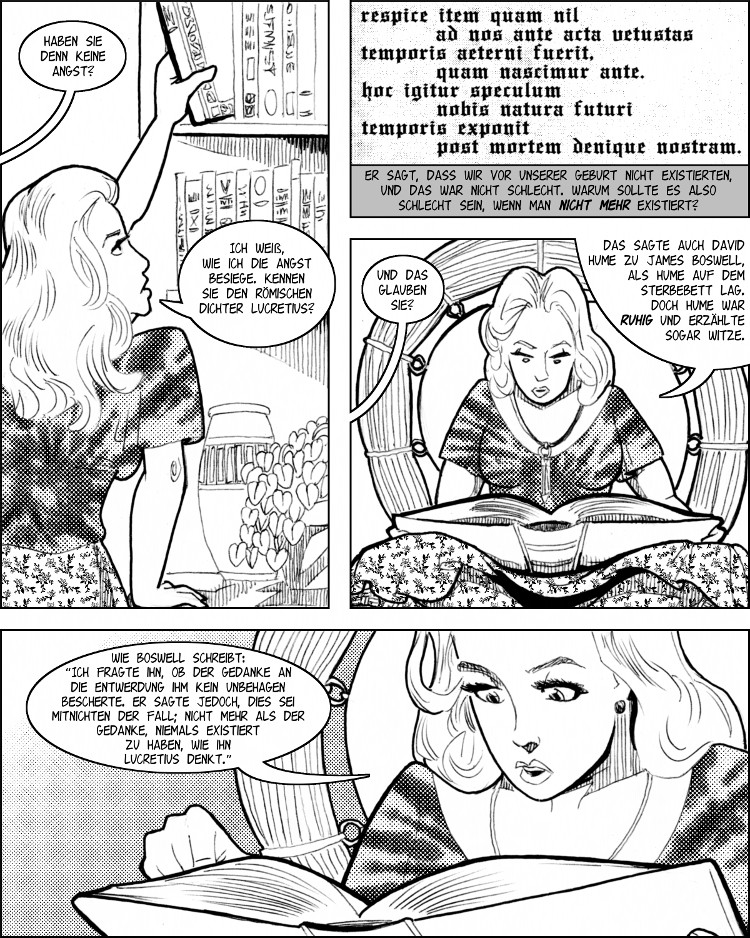

This work is licensed under a Creative Commons Attribution-NonCommercial-ShareAlike 4.0 International License.
PAGE 10 (Four panels)
Panel 1: Still in the same apartment where the interview is taking place, but Eliza is now on tiptoes taking a heavy book down from a a high shelf.
Unseen interviewer (1): Seriously, aren’t you afraid?
Translation (1): Haben Sie denn keine Angst?
Eliza (2): I have something to make the fear go away. Have you heard of the Roman poet Lucretius?
Translation (2): Ich weiß, wie ich die Angst besiege. Kennen Sie den römischen Dichter Lucretius?
Panel 2: Close-up around some text, the following lines from Lucretius’s De rerum natura, set in a very old typeface or (better if possible) as medieval manuscript: “respice item quam nil ad nos ante acta vetustas/temporis aeterni fuerit, quam nascimur ante./hoc igitur speculum nobis natura futuri/temporis exponit post mortem denique nostram.“
CAPTION – ELIZA NARRATING (3): He explains that we didn’t exist for an eternity before being born, and that wasn’t bad. So why should it be bad once we stop existing?
Translation (3): Er sagt, dass wir vor unserer Geburt nicht existierten, und das war nicht schlecht. Warum sollte es also schlecht sein, wenn man nicht mehr existiert?
Panel 3: Eliza, now sitting cross-legged in her big wicker chair. She has the large book she brought down in Panel 1 resting open on her lap. She’s pointing down at something on a page.
Unseen interviewer (4): And you buy that?
Comment (4): “And you buy that?” is an idiom in American English, the literal meaning of which is “Do you really believe that?”
Translation (4): Und das glauben Sie?
Eliza (5): It’s what David Hume told James Boswell as Hume was wasting away, about to die. But Hume was calm and even told jokes.
Translation (5): Das sagte auch David Hume zu James Boswell, als Hume auf dem Sterbebett lag. Doch Hume war ruhig und erzählte sogar Witze.
Panel 4: Eliza looking down at the page of the book open on her lap, reading.
Eliza (6): From Boswell’s account: “I asked him if the thought of annihilation never gave him any uneasiness. He said not the least; no more than the thought that he had not been, as Lucretius observes.”
Comment (6): Eliza is quoting from a real literary work, James Bosewell’s Life of Johnson. If there is a public domain version of the Life in your target language, you are encouraged to substitute its text for your own translation.
Translation (6): Wie Boswell schreibt: “Ich fragte ihn, ob der Gedanke an die Entwerdung ihm kein Unbehagen bescherte. Er sagte jedoch, dies sei mitnichten der Fall; nicht mehr als der Gedanke, niemals existiert zu haben, wie ihn Lucretius denkt.”
![]() Köder (Deutsch/Langseitige Version)
Köder (Deutsch/Langseitige Version)
Köder (Deutsch/Dia-Version)
